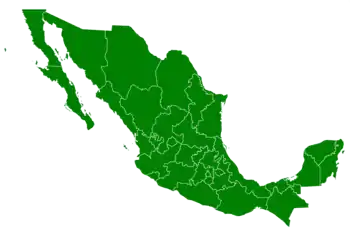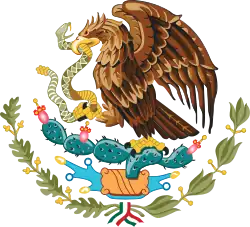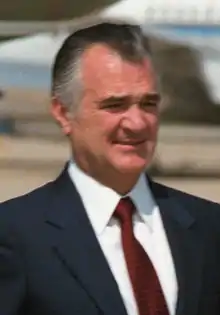1982 Mexican general election
General elections were held in Mexico on 4 July 1982.[1] The presidential elections were won by Miguel de la Madrid, who received 74.3% of the vote. In the Chamber of Deputies election, the Institutional Revolutionary Party won 299 of the 372 seats,[2] as well as winning 63 of the 64 seats in the Senate election.[3] Voter turnout was 74.8% in the presidential election and 72.6% and 66.4% for the two parts of the Chamber elections.[4]
| ||||||||||||||||||||
| ||||||||||||||||||||
 The PRI candidate won in all of the states plus the Federal District. | ||||||||||||||||||||
| ||||||||||||||||||||
 |
|---|
| This article is part of a series on the politics and government of Mexico |
|
|
Rosario Ybarra, who was nominated presidential candidate by the Revolutionary Workers' Party, was the first woman ever to run for president in a Mexican election.
These would be the last of the symbolic/non-competitive Presidential elections in which the PRI (in power since 1929) and its presidential candidate faced no serious opposition and won by a huge margin.
Background
The previous presidential elections, celebrated in 1976, had featured only one presidential candidate (José López Portillo). The lack of any opposition in that election raised serious doubts, nationally and internationally, regarding the legitimacy of the Mexican political system under the PRI, which had been in power since 1929.[5] Due to this, a political reform was passed in 1977 which allowed many more parties to compete in federal elections (notoriously including the decades-old Mexican Communist Party, which until then had been barred from participating in elections) as well as providing better representation for opposition parties in the Chamber of the Deputies.[6]
As a result, nine political parties were able to participate in the 1982 elections. In the presidential election, there were seven registered candidates, which at the time was the biggest number of candidates registered in a presidential election and was a stark contrast with the single-candidate election of 1976.
Nonetheless, these proved to be rather cosmethic changes, as the PRI continued to be the dominant party and practices of vote buying and electoral fraud remained widespread. It wasn't until the mid-to-late 80's that the PRI began to face real challenges at the state and federal levels by opposition parties (particularly, by the PAN and the PRD).
Results
President
| Candidate | Party | Votes | % |
|---|---|---|---|
| Miguel de la Madrid | Institutional Revolutionary Party | 16,748,006 | 74.3 |
| Popular Socialist Party | |||
| Authentic Party of the Mexican Revolution | |||
| Pablo Emilio Madero | National Action Party | 3,700,045 | 16.4 |
| Arnoldo Martínez Verdugo | Unified Socialist Party of Mexico | 821,995 | 3.7 |
| Ignacio González Gollaz | Mexican Democratic Party | 433,886 | 1.9 |
| Rosario Ybarra | Revolutionary Workers' Party | 416,448 | 1.9 |
| Cándido Díaz Cerecedo | Socialist Party of the Workers | 342,005 | 1.5 |
| Manuel Moreno Sánchez | Social Democratic Party | 48,413 | 0.2 |
| Non-registered candidates | 28,474 | 0.1 | |
| Invalid/blank votes | 1,053,616 | – | |
| Total | 23,592,888 | 100 | |
| Source: Nohlen | |||
Senate
| Party | Votes | % | Seats | ± |
|---|---|---|---|---|
| Institutional Revolutionary Party | 63 | -1 | ||
| Popular Socialist Party | 1 | +1 | ||
| Invalid/blank votes | – | – | – | |
| Total | 64 | 0 | ||
| Source: Nohlen | ||||
Chamber of Deputies

| Party | Mayoria | Partido | Seats | ± | ||
|---|---|---|---|---|---|---|
| Votes | % | Votes | % | |||
| Institutional Revolutionary Party | 14,501,988 | 69.4 | 14,289,793 | 65.7 | 299 | +3 |
| National Action Party | 3,663,846 | 17.5 | 3,786,348 | 17.4 | 51 | +8 |
| Unified Socialist Party of Mexico | 914,365 | 4.4 | 932,214 | 4.3 | 17 | New |
| Popular Socialist Party | 395,006 | 1.9 | 459,303 | 2.1 | 10 | -1 |
| Mexican Democratic Party | 475,099 | 2.3 | 534,122 | 2.1 | 12 | +2 |
| Socialist Party of the Workers | 372,679 | 1.8 | 428,153 | 2.0 | 11 | +11 |
| Authentic Party of the Mexican Revolution | 282,971 | 1.4 | 282,004 | 1.3 | 0 | -12 |
| Revolutionary Workers' Party | 264,632 | 1.3 | 308,099 | 1.4 | 0 | New |
| Social Democratic Party | 38,994 | 0.2 | 53,306 | 0.3 | 0 | New |
| Non-registered candidates | 108 | 0.0 | 671,999 | 3.1 | 0 | 0 |
| Invalid/blank votes | 10,192 | – | 1,121,378 | – | – | – |
| Total | 20,919,880 | 100 | 22,866,719 | 100 | 400 | 0 |
| Source: Nohlen | ||||||
References
- Nohlen, D (2005) Elections in the Americas: A data handbook, Volume I, p453 ISBN 978-0-19-928357-6
- Nohlen, p468
- Nohlen, p470
- Nohlen, p454
- Riding, Alan (13 June 1976). "Mexico elects a symbol". The New York Times. Retrieved 27 June 2020.
- G.T. Silvia (2001) La transición inconclusa : treinta años de elecciones en México, p35 ISBN 968-12-1042-5

.svg.png.webp)